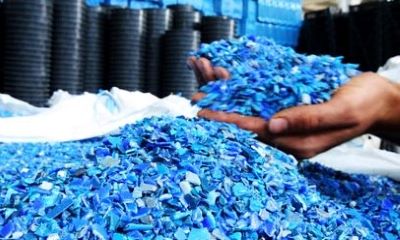Slew of solutions necessary to address plastic recycling as one fits all approach doesn’t work

The global annual plastic production is estimated to be at 400 million tonnes, which is forecasted to reach 1,100 million tonnes by 2050. From the 8.3 billion tonnes of plastics that have been produced so far, only about 9% have been recycled. Most of the plastic is either land-filled or ends up uncontrolled in the environment.
While India’s per capita plastic consumption is estimated to be lower than the global average of 11 kg against 29 kg, the amount of plastic waste generated is 3.4 million metric tonnes annually.
In this context, India's leading industry experts spoke at the session, ‘Plastic Pollution-Strengthening the role of the industry’ on the sidelines of the 4th edition of Indian Chemicals Council (ICC) Sustainability Conclave held in New Delhi on November 17-18, 2022.
“The India Plastics Pact is a collaboration between the Confederation of Indian Industry (CII) and WWF India. The Pact focuses on addressing the barriers to circularity in the plastic packaging sector through four ambitious time-bound targets. We aim to define a list of unnecessary or problematic plastic packaging and items and take measures to address them through redesign and innovation. Another target is to achieve 100% of plastic packaging to be reusable, recyclable or compostable. We are also targeting effective 50% recycling of plastic packaging. 25% of average recycled content across all plastic packaging,” said Dr Nandini Kumar, Senior Consultant, CII (Indian Plastic Pact).
“Focusing on 2030 goals, we have 35 members onboard. We are working on a guidance document for recycling that will help in redefining the recycling system. We have a guidance document for PET. I believe we require a slew of solutions as a single solution that fits all approaches won’t work,” added Dr Kumar.
“Plastic industry consists of 720 new manufacturers. There are 5,000 plastic producers and converters. They have an ability to mobilize 50,000 to 60,000 tonnes or beyond producing groups. At the same time, there are 70 plus recycling clusters in India. Most of them are thriving without government support and therefore, there is need for more engagements for investments, “said Hiten Bheda, Chairman, Environment Committee, AIPMA
“We must supplement the idea of recycling clusters in regional clusters. We must bring the informal recycling segment into the mainstream. Since registration is costly, they bear per litre cost and it is not financially available for them. Bringing them onboard a formal platform will help. The focus must also be in the technology development for better recycling options,” added Bheda.
“There has to be a funnel for selection of chemicals that could be recycled. The effectiveness of technologies also needs to be increased through innovation. We must remember that plastics don’t litter by themselves. It is the people who do it. There is a need for better awareness among people about the responsibility towards the environment,” said Dr Sameer Joshi, Hon. Treasurer, Indian plastics Institute.
“90% of the plastic bottles in the Norwegian market are recycled. The municipalities collect the consumer waste and then it is transferred to sorting or recycling facilities. Plastic packaging waste from trade, industry and agriculture is collected by commercial waste-companies. Milk centres are regulated in a way that bottles with lids are collected back. There is an incentive scheme for enabling recycling. That helped in creating a system for collection and tracking,” said Martine Bottheim, Minister Counsellor, Royal Norwgian Embassy, New Delhi.
Jacqueline Alvarez, Chief Chemicals & Helath Branch, United Nations Environment Programme who moderated the session outlined the need for increasing awareness among stakeholders especially consumers, better management of plastic recycling and balanced regulations.
Themed as ‘Boardrooms to Community- ESG, Carbon Neutrality, Operational Safety, Greener Solutions’ the two-day conclave broadly focused on the topics such as ESG in Boardrooms: Vision and Strategies for value creation; Decarbonizing the Chemical Sector: Reflections to Actions Product; Stewardship: Going beyond Regulatory Landscape; Unlocking the potential of Digital Transformation for Sustainability; Exploring Green Growth Opportunities: Solutions & Technologies; Leveraging Cleaner Energy Transitions; Safety promotes Sustainability; Embracing Net-Zero Transition: Risks & Opportunities; and Session by UNEP -Plastic Pollution: Strengthening the Role of the Industry.
Various speakers expressed their views on climate, sustainable development and the steps that could be taken in this direction. CEOs and representatives of the Indian and global chemical companies, people working in EHS dept. in companies; Central and State Government officials, Pollution Control Boards, international multilateral organizations, Global chemical industry bodies and experts from Academia and civil society organizations are participating in the event.
The annual flagship event is a major initiative of ICC for promoting sustainability in the management of the entire life cycle of chemicals.
Indian Chemical News was one of the leading official media partners of the event.
Subscribe to our newsletter & stay updated.